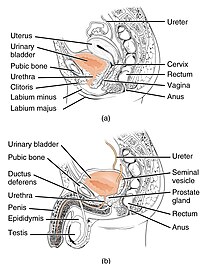
Photo from wikipedia
The prevalence of fecal incontinence (FI) in care homes is estimated to range from 30% to 50%. There is limited evidence of what is effective in the reduction and management… Click to show full abstract
The prevalence of fecal incontinence (FI) in care homes is estimated to range from 30% to 50%. There is limited evidence of what is effective in the reduction and management of FI in care homes. Using realist synthesis, 6 potential program theories of what should work were identified. These addressed clinician-led support, assessment, and review; the contribution of teaching and support for care home staff on how to reduce and manage FI; addressing the causes and prevention of constipation; how cognitive and physical capacity of the resident affects outcomes; how the potential for recovery, reduction, and management of FI is understood by those involved; and how the care of people living with dementia and FI is integral to the work patterns of the care home and its staff. Dementia was a known risk factor for fecal incontinence (FI), but how it affected uptake of different interventions or the dementia specific continence and toileting skills staff require, were not addressed in the literature. There was a lack of dementia-specific evidence on continence aids. Most care home residents with FI will be doubly incontinent; there is, therefore, limited value in focusing solely on FI or single causes, such as constipation. Medical and nursing support for continence care is an important resource, but it is unhelpful to create a distinction between what is continence care and what is personal or intimate care. Prompted toileting is an approach that may be particularly beneficial for some residents. Valuing the intimate and personal care work unqualified and junior staff provide to people living with dementia and reinforcement of good practice in ways that are meaningful to this workforce are important clinician-led activities. Providing dementia-sensitive continence care within the daily work routines of care homes is key to helping to reduce and manage FI for this population.
Journal Title: Journal of the American Medical Directors Association
Year Published: 2017
Link to full text (if available)
Share on Social Media: Sign Up to like & get
recommendations!